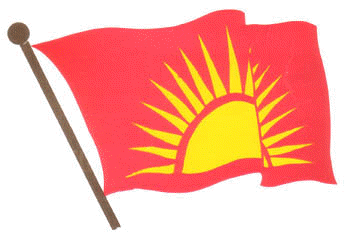[see also
 Earned
Sovereignty: Bridging the Gap between Self Determination and Sovereignty 2003
"There are currently over fifty sovereignty-based conflicts throughout the
world, and nearly a third of the Specially Designated Global Terrorists
listed by the United States Treasury Department are associated with
sovereignty-based conflicts and self-determination movements. To date, the
�sovereignty first� international response to these conflicts has been
unable to stem the tide of violence, and in many instances may have
contributed to further outbreaks of violence. This article will argue that
the �sovereignty first� doctrine is slowly being supplemented by a new
conflict resolution approach which we dub �earned sovereignty.�
Earned
Sovereignty: Bridging the Gap between Self Determination and Sovereignty 2003
"There are currently over fifty sovereignty-based conflicts throughout the
world, and nearly a third of the Specially Designated Global Terrorists
listed by the United States Treasury Department are associated with
sovereignty-based conflicts and self-determination movements. To date, the
�sovereignty first� international response to these conflicts has been
unable to stem the tide of violence, and in many instances may have
contributed to further outbreaks of violence. This article will argue that
the �sovereignty first� doctrine is slowly being supplemented by a new
conflict resolution approach which we dub �earned sovereignty.�
 Statement by LTTE on
5th Anniversary of Ceasefire by Sri Lanka, 22 February 2007
"In contrast to current international practice with respect to national
conflicts in other parts of the world, the international community�s
insistence on a solution that does not infringe on the territorial integrity
and sovereignty of Sri Lanka is deeply frustrating for the Tamil people. The
denial of the Tamil people�s will is itself a breach of the law of
self-determination. The international community has not rejected, for
example, the
South Sudan Machkos Protocol facilitated by US, UK, Norway and Italy on
the basis it is affecting the sovereignty of Sudan. Nor has the
international community questioned the
Serbia-Montenegro agreement and the recent proposal on the future of
Kosovo on the basis that these contravene Serbian sovereignty. The
Papua New Guinea- Bougainville Agreement was not opposed by the
international community on the basis of safeguarding territorial integrity
and sovereignty. In all these cases the peoples concerned have exercised
their right to self-determination and sovereignty. The marginalisation of
the 2002 CFA, which would have been a step towards just peace, has destroyed
the confidence of the Tamil people and their expectations regarding future
peace efforts."
Statement by LTTE on
5th Anniversary of Ceasefire by Sri Lanka, 22 February 2007
"In contrast to current international practice with respect to national
conflicts in other parts of the world, the international community�s
insistence on a solution that does not infringe on the territorial integrity
and sovereignty of Sri Lanka is deeply frustrating for the Tamil people. The
denial of the Tamil people�s will is itself a breach of the law of
self-determination. The international community has not rejected, for
example, the
South Sudan Machkos Protocol facilitated by US, UK, Norway and Italy on
the basis it is affecting the sovereignty of Sudan. Nor has the
international community questioned the
Serbia-Montenegro agreement and the recent proposal on the future of
Kosovo on the basis that these contravene Serbian sovereignty. The
Papua New Guinea- Bougainville Agreement was not opposed by the
international community on the basis of safeguarding territorial integrity
and sovereignty. In all these cases the peoples concerned have exercised
their right to self-determination and sovereignty. The marginalisation of
the 2002 CFA, which would have been a step towards just peace, has destroyed
the confidence of the Tamil people and their expectations regarding future
peace efforts."
 Statement issued by Political
Wing Liberation Tigers of Tamil Eelam to the 62nd session of the United
Nations General Assembly, 24 September 2007 "...Expectations of the
Tamil people from the international community ...We urge the
international community: to recognize the concept of the sovereignty of the
Tamil people, and support the peace process in accordance with this
principle (and) to provide appropriate opportunities to the Tamil
people to express their aspirations, as have been given to the people of
East Timor and Kosovo..."
Statement issued by Political
Wing Liberation Tigers of Tamil Eelam to the 62nd session of the United
Nations General Assembly, 24 September 2007 "...Expectations of the
Tamil people from the international community ...We urge the
international community: to recognize the concept of the sovereignty of the
Tamil people, and support the peace process in accordance with this
principle (and) to provide appropriate opportunities to the Tamil
people to express their aspirations, as have been given to the people of
East Timor and Kosovo..."
 Earned Sovereignty: East Timor�Kosovo�Sri Lanka? Defence Wire, 28
September 2007 "...The
statement issued by the LTTE political wing to coincide with the 62nd
General Assembly of the UN raises several interesting concerns. A careful
look at the statement reveals that this is not just another statement of the
LTTE but a policy statement that spells out its future strategic direction.
I refer to the final section of the paper that refers to the expectations of
the Tamil people from the international community..."
Earned Sovereignty: East Timor�Kosovo�Sri Lanka? Defence Wire, 28
September 2007 "...The
statement issued by the LTTE political wing to coincide with the 62nd
General Assembly of the UN raises several interesting concerns. A careful
look at the statement reveals that this is not just another statement of the
LTTE but a policy statement that spells out its future strategic direction.
I refer to the final section of the paper that refers to the expectations of
the Tamil people from the international community..."
 Tigers will
bring clarity to Sri Lanka's conflict - K.V.Balakumaran, Senior
Member, LTTE 1 January 2008 "Only the demonstration of military strength
by the Tigers can bring clarity to the situation, for the international
community to correctly relate their interests, and assertively engage.
Consider the countries
Somaliland,
Kosovo, and
Montenegro. The west will intervene when their interests are impacted.
But they are reluctant to enter forcefully in Sri Lanka. Sri Lanka has state
power.... During the war to open A-9, up to 6000 Sri Lankan soldiers
perished, and nearly 3000 Tigers sacrificed their lives. The international
community
accepted the results
of that war, and recognized the LTTE's strength. The question is why
they are not, responding the same way now. In order to change the
international community's view, we are called to suffer more sacrifices of
life. We expect 2008 will be the year where we can overcome the diplomatic
hurdles that confront us. In 2003, we proposed
ISGA (Interim Self Governing Authority) as a framework with which will
satisfy us, our minimal requirements for power-sharing. So based on this,
the international community cannot call us obstinate, or terrorists.
Hillary Clinton also identified us when she articulated a more nuanced
definition of terrorism."]
Tigers will
bring clarity to Sri Lanka's conflict - K.V.Balakumaran, Senior
Member, LTTE 1 January 2008 "Only the demonstration of military strength
by the Tigers can bring clarity to the situation, for the international
community to correctly relate their interests, and assertively engage.
Consider the countries
Somaliland,
Kosovo, and
Montenegro. The west will intervene when their interests are impacted.
But they are reluctant to enter forcefully in Sri Lanka. Sri Lanka has state
power.... During the war to open A-9, up to 6000 Sri Lankan soldiers
perished, and nearly 3000 Tigers sacrificed their lives. The international
community
accepted the results
of that war, and recognized the LTTE's strength. The question is why
they are not, responding the same way now. In order to change the
international community's view, we are called to suffer more sacrifices of
life. We expect 2008 will be the year where we can overcome the diplomatic
hurdles that confront us. In 2003, we proposed
ISGA (Interim Self Governing Authority) as a framework with which will
satisfy us, our minimal requirements for power-sharing. So based on this,
the international community cannot call us obstinate, or terrorists.
Hillary Clinton also identified us when she articulated a more nuanced
definition of terrorism."]


